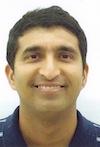2017 Systems Science Scholars
Inas Khayal, Ph.D.
Assistant Professor, The Dartmouth Institute for Health Policy & Clinical Practice, Geisel School of Medicine at Dartmouth; Adjunct Assistant Professor, Computer Science, Dartmouth College
Dr. Inas Khayal is an assistant professor at the Dartmouth Institute of Health Policy & Clinical Practice at the Geisel School of Medicine at Dartmouth and an adjunct assistant professor at the department of computer science at Dartmouth College. She began her career at the Boston University biomedical engineering department and now holds a Ph.D. in bioengineering from the University of California, Berkeley and the University of California, San Francisco Joint Graduate Group. She has also completed the Management of Technology Program from the University of California, Berkeley, Haas School of Business and is a 2008 Mayfield Fellow. Her training and experience in biomedical engineering, management of technology and engineering systems allowed her to develop the concept of Sustainable Health. This began with her biomedical research within the clinic, which was expanded to performing health technological research experiments outside the clinic and within the ‘real-world’ living lab. Her work acts at the intersection of engineering, medicine, and innovation and seeks to develop systems solutions that curb the growth of non-communicable chronic disease. She holds several U.S., European, and international patents and is featured in the book Medicine by Design: The Practice and Promise of Biomedical Engineering by Fen Montaigne.
Naoru Koizumi, Ph.D.
Associate Professor, Schar School of Policy and Government, George Mason University
Dr. Koizumi is associate professor and director for research in the Schar School of Policy and Government at George Mason University. Her primary research concentration has been quantitative analysis on chronic and end-stage renal and liver diseases and evaluations of health policies, particularly in the area of kidney and liver transplantation. She has worked on several National Institutes of Health and National Science Foundation grants as the principal investigator (PI), Co-PI, a consultant, and a post-doc researcher in her career. Three of these grants involved building discrete event simulation and queueing models for which Dr. Koizumi was responsible. Other grants involved applications of geographic information systems and spatial statistics to investigate geographic disparities in disease prevalence and health service access/use.
Yan Li, Ph.D.
Research Scientist, Center for Health Innovation, The New York Academy of Medicine; Assistant Professor, Department of Population Health Science and Policy, The Icahn School of Medicine at Mount Sinai
Dr. Li is a research scientist at the Center for Health Innovation at The New York Academy of Medicine and assistant professor in the department of population health science and policy at the Icahn School of Medicine at Mount Sinai. Dr. Li received a Ph.D. in biomedical engineering from Purdue University and completed postdoctoral training in systems engineering at Texas A&M University. His research interests include systems science modeling in population health and cost-effectiveness analysis. He is particularly interested in advancing both the theory and application of agent-based modeling. Collaborating with multidisciplinary teams, he has developed or co-developed a broad range of innovative systems science models that can be used to, for example, simulate the progression of diabetes and cardiovascular disease, evaluate the cost-effectiveness of alternative cancer screening strategies, predict the impact of local food policies, and optimize capacity for long-term care facilities. These projects have led to a number of publications in leading academic journals in both the health and engineering fields. In addition, he has published several blog posts—such as a recent one in the Health Affairs Blog—to promote the use of systems science in health services research and population health. His research has been supported by both U.S. funding agencies (e.g., Robert Wood Johnson Foundation) and internationally (e.g., European Commission).
Rajeev Rajaram, Ph.D.
Associate Professor, Department of Mathematical Sciences, Kent State University
Rajeev Rajaram is a faculty member at the Department of Mathematical Sciences at Kent State University and an internationally recognized scholar in the field of systems and control theory of differential equations. He has spent the last few years developing new techniques to capture complexity and complex mechanisms from large data sets, using the theory of differential equations, principles of thermodynamics, and statistical mechanics. His methods are currently being used in health, health care, societal infrastructures, power-grid reliability, restaurant mobility, and depression trajectories. He has developed a new technique using genetic algorithms and differential equations to model depression health trajectories of patients. The technique is very general and can be used for any large data set, and has been added to the SACS Toolkit: a mixed-methods, computationally-grounded case-comparative platform for modeling complex systems. He has been instrumental in (a) integrating the tools of complexity science into health science research, (b) exposing professionals and students on the usage of these tools, and (c) infusing existing modeling techniques from Mathematics into areas of health sciences that can benefit from their usage. He has published and presented extensively on the usage of differential equations in capturing complexity in large data sets. He has worked with colleagues in England, Scotland, Republic of South Africa, Holland, and the United States, to use the newly developed method using differential equations, to model complexity and glean complex mechanisms in the power grid, mental depression trajectories, disease progression, restaurant mobility, and fuel-poverty.
Nasser Sharareh, Ph.D. Candidate
Research Assistant, Systems Science and Industrial Engineering, Binghamton University
Nasser is a Ph.D. candidate in the systems science and industrial engineering department of Binghamton University with a concentration on data analysis, geographic information system mapping, and health care policy analysis for complex systems of population-level health issues. He has been involved with several system dynamics modeling transdisciplinary projects and has collaborated with a team of anthropologists, nurses, engineers, and primary care providers to develop models for public health issues like Lyme disease, Ebola, access to care, and HPV infection by looking at determinants of health and spatial-dynamic factors.




